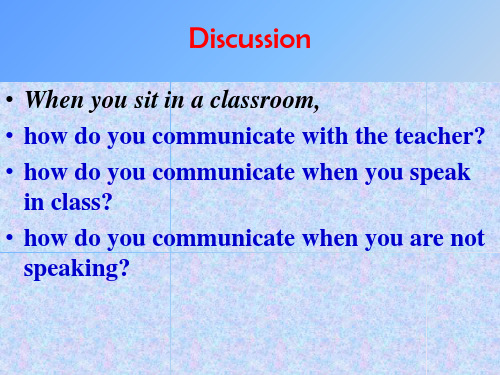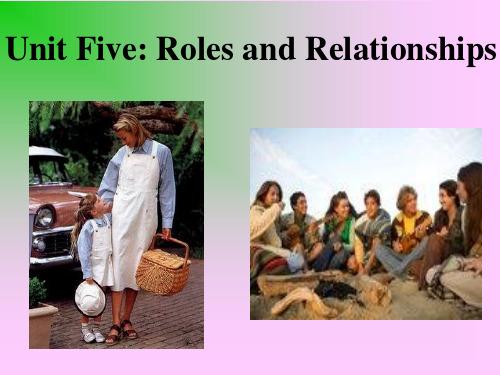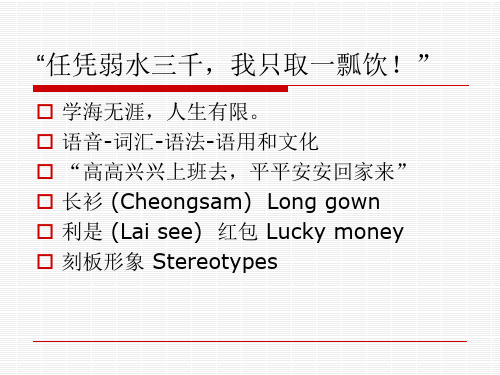跨文化交际复习unit-5
unit 5-body language 1(yyn) 跨文化交际复习指导资料

1. Lead-in
Please watch the video and answer the following questions.
body language 1. What kinds of body languages can you
find in the video?
2. Can our body languages tell a lie?
Questions
• C3. How would you explain the Director’s behavior toward Katherine? How would you make the Director understand why Katherine felt frustrated and angry? 幻灯片 17
Unit 5 Nonverbal Communication
Objectives
1. Learn the differences of time language, space language and body language in different cultures;
2. Learn to improve the cultural awareness; 3. Learn to communicate with people from
Comment (case 3) :
【资料】跨文化交际(unit-5)汇编

Supplement: Verbal Communication
Supplement: Verbal Communication
Verbal communication happens when people from different cultural backgrounds communicate with each other by using language.
Supplement: Verbal Communication
1. Direct and Indirect Verbal Interaction Styles ▪ In the direct verbal style, statements clearly reveal the
speaker’s intentions. Eg. U.S. Americans tend to use a straightforward form of request. ▪ In the indirect verbal style, on the other hand, verbal statements tend to hide the speaker’s actual intentions. Eg. Chinese tend to ask for a favor in a more roundabout and implicit way.
Eg. In the classified ads, Japanese ad might read, “Although I am not very good-looking, I’m willing to try my best.”
Supplement: Verbal Communication
跨文化交际Unit 5

munication between Men and Women
The differences do exist in the way males and females communicate, and the more significant differences are cultural. In other words, there are social expectations of how to be male or female. Women tend to speak and hear a language of connection and intimacy, whereas men speak and hear a language of status and independence. (Deborah Tannen, “You Just Don’t Understand”)
跨文化交际U5

5. Relationships and family considerations
Problems with relationships such as the failure of the spouse and other family members to adapt to the new culture are a major factor in the early return of expatriates.
3. A third strategy is known as addition. The person adds the behavior of the host culture when in the presence of the nationals but maintains the home culture behav- when ior with others of the same culture. 4. A fourth strategy is known as synthesis. This strategy integrates or combines elements of the two cultures such as combining the dress of the United States and the Philippines.
Culture Shock
文化休克
Contents
1 What is culture shock?
ቤተ መጻሕፍቲ ባይዱ
2
Intercultural Adaptation
3
Intercultural Adaptation
4
How to avoid culture shock?
跨文化交际实用教程unit-5

Body distance, body touch
Time language / chronemics
Puctuality, promptness, time orientation, long or short, etc.
Paralanguage (voice modulation)
Body distance
• Four major types of distances in American
social and business circumstances (Edward Hall,1959)
• Cultural variation of body distance
Body touch
People express their appreciation “well done” with a clap or apology “I’m sorry” with a serious look.
In a Chinese classroom, if the teacher notices a student’s attention begins to wander, he usually would give him / her a glance or a stare without interrupting the lecture.
4
Functions of nonverbal communication
Nonverbal communication can serve a variety of purposes for the verbal messages, such as:
大学跨文化英语综合教程IUnit5GivingandReceiving语言点

大学跨文化英语综合教程IUnit5GivingandReceiving语言点Text A1. There are disadvantages to being advantaged. —Those who have more money or a higher social status than others may find themselves in an unfavorable position.disadvantage n. sth. that makes a person or thing to be less likely successful or effective 不利条件,劣势e.g. The main disadvantage of the material is that it fades in strong sunlight.Anyone who can’t use a computer is at a disadvantage these days.advantaged a. having more money, a higher social status, etc. than sb. else (在社会或经济上)处于优越地位的e.g. Some of the boys come from less advantaged backgrounds.We aim to improve opportunities for the less advantaged in society.2. guilty a. feeling ashamed because you have done sth. that you know is wrong or have notdone sth. that you should have done 感到内疚的e.g. I feel guilty for forgetting her birthday again.It was his guilty conscience that made him other to help.3. comprehend vt. understand sth. that is difficult 理解e.g. She cannot comprehend the extent of the disaster.I did not fully comprehend what had happened.4. peer n. a person who is the same age or who has the same social status as you 同龄人,身份同的人e.g. American children did less well in math than their peers in Japan.Children are worried about failing in front of their peers.5. blame vt. say that sb. or sth. is responsible for sth. bad 责备e.g. The report blames the accident on poor safety standards.One of the computers is broken and sh e’s blaming it on me.6. entirely ad. completely and in every possible way 完全地e.g. Our situation is entirely different.I’m not entirely happy about the proposal.7. Many of the parents do not readily concern themselves with teaching such behavior feelings because they probably do not easily identify with either the guilt or the close mindedness, having grown up themselves under very different circumstances. —Many of the parents were born and raised in wealthy families, so they may not know much about ordi nary people’s lives, nor do they feel bad about the privi leges that they enjoy. As a result they do not bother teaching their children behaviors or feelings like these.concern oneself with: give sth. attention because you think it is important 关心e.g. He just concerned himself with facts and not with individuals.He loved his wife, and concerned himself with her needs and desires.identify with: feel that you can understand and share the feelings of sb. else 理解,认同e.g. Humans can easily identify with the emotional expressions of chimpanzees.He identified with our distress and despair.under ... circumstances: in ... conditions 在……情况下e.g. The company reserves the right to cancel this agreement under certain circumstances.Under these circumstances, it seemed better not to tell him about the accident.8. How, then, to behave? — How, then, should one do things?9. fundamental a. important and essential 基本的,主要的e.g. Our constitution embodies all the fundamental principles of democracy.Hard work is fundamental to success.10. It helps foster a healthy personality by being yet another way for that child to feel valuable.—It helps the child develop a wholesome character by finding a different way for the child to feel useful and important.foster vt. help a skill, feeling, idea, etc. develop over a period of time 培养,促进e.g. Th e club’s aim is to foster better relations with in the community.He said that developed countries had a responsibility to foster global economic growth to help developing countries.11. It helps the teenager develop a more passionate outlook. —It helps the teenager develop a more positive and hopeful attitude towards life and the world.passionate a. having or showing strong feelings of enthusiasm for sth. or belief in sth. 热情的e.g. I’m a p assionate believer in public art.He is very passionate about the project.outlook n. general attitude towards life and the world 人生观e.g. Most western societies are liberal in their outlooks.Exercise will improve both your looks and your outlook.12. genuinely ad. really 真实地e.g. The boy seemed genuinely interested.He was genuinely surprised when she appeared out of the blue.13. accomplish vt. succeed in doing sth., especially after trying very hard 达到e.g. If we all work together, I think we can accomplish our goal.We have accomplished everything we set out to do.14. portion n. one part of sth. larger 部分e.g. His portion of the rent was $500 a month.Th e main character’s childhood takes up a good portion of the movie.15. charity n. an organization which aims to help people in need 慈善机构e.g. Several charities sent aid to the ?ood victims.The concert will raise money for local charities.16. cause n. an organization or idea that people support or fight for (支持或为之奋斗的)事业,思想e.g. Animal welfare campaigners raised $70,000 for their cause last year.The donation is the biggest private gif to a humanitarian (人道主义的) cause.17. The parents can supply some of the money with the children contributing, too.—The parents can donate some of their mo ney along with the children’s money.supply vt. provide sb./sth. with sth. that they need or want, especially in large quantities 提供e.g. Local schools supply many of the volunteers.Paint for the project was supplied by the city.contribute vi. give sth., especially money or goods, to help sb. or sth. 捐赠,贡献e.g. Would you like to contribute to our collection?The three sons all contribute to the family business.18. vote vi. show formally by marking a paper or raising your hand which person you want towin an election, or which plan or idea you support 投票e.g. I voted for the Labor candidate in the last election.Did you vote for or against her?19. gradually ad. slowly 渐渐地e.g. Jill gradually became aware of an awful smell.Gradually, my ankle got better.20. give away: give sth. to sb. without asking for any money, rather than selling it to them 赠送e.g. I gave away most of my books when I left college.He gave away most of his money to charity.21. self-centered a. tending to think only about yourself and not thinking about the needs or feelings of other people 自我中心的e.g. He was self-centered, but he wasn’t cruel.For me, it changes my life from being purely self-centered to being something with meaning for others, too.22. down on one’s luck: unfortunat e, down and out 不走运的,穷困潦倒的e.g. When someone is down on their luck, friends are very difficult to fnd.You really fi nd out who your friends are when you’re down on your luck!23. be in a position to do sth.: be able to do sth. because you have the ability, money, or power to do it 可(能)做某事e.g. When I know all the facts, I’ll be in a position to advise you.The UN system will be in a position to support the extensive relief efforts needed.24. enable sb. to do sth.: make it possible for sb. to do sth., or for sth. to happen 使某人能够做某事e.g. The loan enabled Jan to buy the house.Te software enables you to access the Internet in seconds.25. notion n. an idea, a belief or an understanding of sth. 观念,看法e.g. The traditional notion of marriage goes back thousands of years.She had only a vague notion of what she wanted to do.26. privilege n. a special right or advantage available only toa particular person or group 特权e.g. He had no special privileges and was treated like every other prisoner.Education should be a universal right and not a privilege.27. further vt. help sth. progress or be successful 促进,推动e.g. He dedicated his life to furthering the cause of world peace.Alan had been using her to further his career.28. Th ere is just so much room in a child’s hear t for compassion toward others burdened by problems never actually seen ... —A child’s heart is so broad that he or she always has great potential to develop or show sympathy towards those who face so many problems that the child has never seen ...burden vt. give sb. a duty, responsibility, etc. that causes worry, difficulty or hard work 使担负e.g. They have burdened themselves with a high mortgage (按揭贷款).I don’t want to burden you with my worries.29. privileged a. having special rights or advantages that most people do not have 享有特权的e.g. She comes from a privileged background.In those days, only a privileged few had the opportunity to vote.30. re?ection n. careful thought about sth., sometimes over a long period of time 深思e.g. A moment’s re?ection will show the stupidity of this argument.At first I disagreed, but aft er some re?ection, I realized she was right.31. crisis n. a time of great danger, difficulty or confusion when problems must be solved or important decisions must be made 危机e.g. The country now faces an economic crisis.The Prime Minister was criticized for the way in which he handled the crisis.32. prompt vt. cause sth. to happen 促使,引起e.g. The discovery of the bomb prompted an increase in security.His speech prompted an angry outburst from a man in the crowd.33. remark vi. say or write a comment about sth. or sb. 谈论,评论e.g. The similarities between the two have often been remarked on.On several occasions she had remarked on the boy’s improvement.34. lack n. the state of not having sth. or not having enoughof sth. 缺少,缺乏e.g. Too many teachers are treated with a lack of respect.There was no lack of willing helpers.35. awareness n. knowing that sth. exists and is important 意识e.g. Health officials have tried to raise awareness about AIDS.It is important that students develop an awareness of how the Internet can be used.36. carefree a. having no worries or problems 无忧无虑的e.g. He thought back to the carefree days of his childhood.He looked happy and carefree.37. In other words, a privileged upbringing, unrestrained by reality and an involvement with others, has the capacity to provide yet another blow to low self-esteem because it can make a child feel inadequate when dealing with the “wilder world.” —In other words, those fortunate boys and girls were raised to believe that nothing is impossible and that they need not rely on others. Such beliefs may also have a bad effect on the development of their self respect as it can make a child feel unprepared to cope with life in the real world.unrestrained a. not controlled or limited 不受限制的e.g. There was unrestrained joy on the faces of those people.He is vigorous and unrestrained in his behavior.have the capacity to do sth.: have the ability to do sth. 有能力做某事e.g. The question is which of these guys have the capacity to do that.I’m quite pleased that we do have the cap acity to produce that much food.blow n. a sudden event which has damaging effects onsb./sth., causing sadness or disappointment 打击e.g. Joe resigned, which was a severe blow because we needed him desperately.His mother’s death was a shattering blow.wild a. lacking discipline or control 乱糟糟的,混乱的e.g. Everything that could grow was running wild for lack of attention.The boy is wild and completely out of control.Text B1. Our biggest problem with giving and receiving is that we try and track it. —What makesgiving and getting extremely difficult is that when we give people help, we try to keep record of who gets the help.track vt. follow the progress or development of sth. 跟踪(进展情况)e.g. The forecasters are tracking Hurricane Josephine.The research project involves tracking the careers of 400 graduates.2. And when we do that, we lose the beat. —When we try to track who gets help from us, we act like a dancer failing to follow the rhythm.3. Along his journey, he realized that it’s not just enough, as the cliché goes, to find your gifs.—In the process of practicing giving and getting, he became aware of the fact that it’s a lot more than just figuring out, as people often say, what you are good at.4. cultivate vt. work hard to develop a particular skill, attitude, or quality 培养e.g. Cultivating a positive mental attitude towards yourself can reap tremendous benefts.One should cultivate good manners from childhood.5. fancy a. expensive and fashionable 高档的e.g. They sent their daughter to a fancy private school.Wow, that will be a fancy present.6. upwards of more than……以上,多于……e.g. I waited for upwards of an hour.The typhoon killed upwards of 20,000 people.7. oblige vi. help sb. by doing what they ask or what you know they want (根据要求或需要)帮忙,效劳e.g. Call me if you need any help —I’d be happy to oblige.We need a guide and he was only too happy to oblige.8. cover vt. provide enough money for sth. 支付e.g. They gave us 50 pounds to cover our traveling expenses.How much do you need? — Twenty pounds should cover it.9. principal a. most important 主要的e.g. That was my principal reason for moving.Land, labor and capital are the three principal factors of production.10. … I was only trying to make your day. — ... I was doing this only for the sake of making you happy.11. overwhelming a. very great or very strong; so powerful that you cannot resist it or decide how to react 势不可挡的,压倒的e.g. This is our challenge and our overwhelming responsibility.At that time, I felt an overwhelming sense of powerlessness.12. … what goes around comes around. — ... what you do to others will eventually a?ect you; goodness will have a good reward (善有善报).13. renew vt. begin doing sth. again after a period of notdoing it 重新开始,继续e.g. She renewed her efforts to escape.The kidnappers renewed their threats.14. … the real reward of that give and take doesn’t lie in the value of what’s being exchanged.—... what one can really benefit from the act of giving and receiving is not how much is being given or received.15. spontaneously ad. not planned and happen naturally 自发地e.g. A crowd of people gathered spontaneously at the scene of the accident.The children laughed spontaneously.16. empty vt. remove everything that is inside sth. 清空e.g. I emptied the ashtray.The room had been emptied of all furniture.17. The cashier looks on, as we all share a beautiful, awkward, empathy-filled moment of silence. —The cashier gazes at us, while none of us is talking. It is a moment of silence that brings us a good feeling, a sense of not knowing what to do, and an understanding of each other’s emotions.awkward a. making you feel embarrassed 难堪的,尴尬的e.g. There is an awkward pause.The honest, if not awkward, answer is no.18. delighted a. very pleased and happy 高兴的e.g. I know Frank will be delighted to see you.I was delighted at/by your news.。
跨文化交际-Unit 5

Projected Cultural Similarity
The tendency to assume that people from other cultures basically think and feel more or less the same way we do. There are sufficient similarities among peoples of the world to make communication easy. Once you get used to their different (dress, manners, style) they are just like us. Denial, defense, minimization, acceptance, adaptation, and integration. (Ethnocentrism)
Projected Cultural Similarity
The Golden Rule: Do unto others what you would have them do unto you./ Do as you would be done by. Do not unto others what you would not be done by. 己所不欲勿施于人 Expecting others to be the same as we are/do the same as we do Culture shock Frustration Wince Other Obstacles: Stereotype, ethnocentrism
Low context communication
大学英语跨文化交际U5课文翻译、词汇、习语整理

Unit 5Nonverbal communication课前谚语+名言:1、I’s not what he said, but the way he said it.——English saying2、There is a language in her eyes, her cheeks, her lips.——William Shakespeare案例一:个人空间马克最近从丹麦搬到了悉尼,在一家澳大利亚公司当销售员。
他被邀请加入当地的一个俱乐部。
有一天在一个晚会上,一个女成员走近他,马克立即通过谈论展现出了他的兴趣。
起初聊天进行的很顺利,但随着谈话的进行,马克逐渐的向她靠近,而那位女士似乎离他越来越远,并显得很不自在。
当马克正要问她有关于澳大利亚习俗的问题时,站在旁边的一个男士往这边瞟了一眼,她找了个借口离开,去和那个男人说话。
留下马克傻傻的站在那里,他不知道为什么他们的交谈如此突然地停止了。
Question:Why did that women suddenly stop talking with mark and turned to another man?注释:这是一个对身体距离理解不同造成的误会。
在丹麦,正式场合中,个人空间大概在20厘米-30厘米之间。
而在澳大利亚,这样的场合需要40厘米-50厘米的身体距离。
所以丹麦人习惯近距离交谈,澳大利亚人习惯远距离交谈。
在这个情况下,马克尝试去建立自己正常的个人亲密空间,侵犯了澳大利亚女士的空间,正因如此,她感到了某种威胁,失去了舒适感。
就在那时,身旁的男人给了她一个离开的机会。
如果马克对于澳大利亚人所期待的个人空间有所了解的话,或许这个谈话会有所不同。
案例二:使用当地语言的问题。
弗兰克为了做研究的目的从澳大利亚来到中国,为此,他在大学里刻苦学习中文,并且能用中文很方便的和人交流。
而当他到达北京以后,他开始和当地人交谈,询问方向和建议。
尽管他几乎都是用中文和他们交流,但是他发现周围的人有时候会笑着用英语回答他,尽管他们对英语知之甚少。
跨文化交际UNIT 5

▪ The self-effacement verbal style, on the other hand, emphasizes the importance of humbling oneself via verbal restraints, hesitations and modest talk.
Eg. In the classified ads, Japanese ad might read, “Although I am not very good-looking, I’m willing to try my best.”
Review of Unit 4
1. What is the relationship between language and culture according to the Sapir-Whorf Hypothesis?
2. Translate the following terms: housewarming disinterested Mind one’s p’s and q’s A nine days wonder 红糖 红茶 眼红 青天
▪ It is often customary for Americans to start their talk with some jokes or humorous anecdotes, but Germans have different ideas and they tend to consider telling jokes inappropriate in talks on serious matters. And in German culture, executives who occupy important positions are usuad not expected the American manufacturer to send a young man as their representative to start business with them, a reputable German distributor. They may have found it difficult to trust such a young person.
跨文化交际课程unit5

Nonverbal Communication Time language Space language Body language Paralanguage
Content
Байду номын сангаас
Cultural Values
Comparison Between Chinese Values and Western Values
For example: Red means luck and fortune in most Eastern cultures but stands for blood, revolution in the West. Blue means something noble or significant in the Western culture.
Dick embraced her and gave her a long and passionate kiss. Seeing this, Chen turned away and walked off toward the cafeteria. When Dick looked up, he saw Chen walking into the cafeteria. Dick was puzzled as to why Chen didn't wait for him, and went to the cafeteria alone. Question for discussion Could you expain to Dick why Chen Liang walked into the cafeteria without waiting for him?
Intercultural Communication
《新编跨文化交际英语教程》复习资料U5

Unit 5Culture and Verbal CommunicationSome Ideas Related to verbal communication and culture1. Different orientations to communication patternsEast Asian orientation1. process orientation — communication is perceived as a process of infiniteinterpretation2. differentiated linguistic codes — different linguistics codes are used dependingupon persons involved and situations3. indirect communication emphasis — the use of indirect communication is prevalent and accepted as normative4. receiver centered — meaning is in the interpretation, Emphasis is on listening, sensitivity, and removal of preconception.North American orientation1. communication is perceived as the transference of messages2. Less differentiated linguistic codes — linguistic codes are not as extensively differentiated as East Asia3. Direct communication emphasis — direct communication is norm despite the extensive use of indirect communication4. sender centered — meaning is in the message created by the sender. Emphasis is on how to formulate the best message, how to improve source credibility and delivery skills2. Direct and Indirect Verbal Interaction StylesThe tone of voice, the speaker’s intention, and the verbal content reflect our way of speaking, our verbal style, which in turn reflects our cultural and personal values and sentiments.Verbal style frames “how” a message should be interpreted. The direct-indirect verbal interaction dimension can be thought of as straddling a continuum. Individuals in all cultures use the gradations of all these verbal styles, depending on role identities, interaction goals, and situations. However, in individualistic cultures, people tend to encounter more situations that emphasize the preferential use of direct talk, person-oriented verbal interaction, verbal self-enhancement, and talkativeness. In contrast, in collectivistic cultures, people tend to encounter more situations that emphasize the preferential use of indirect talk, status-oriented verbal interaction, verbal self-effacement, and silence.The direct and indirect styles differ in the extent to which communicators reveal their intentions through their tone of voice and the straightforwardness of their content message. In the direct verbal style, statements clearly reveal the speaker’s intentions and are enunciated in a forthright tone of voice. In the indirect verbal style, on the other hand, verbal statements tend to camouflage the speaker’s actual intentions and are carried out with more nuanced tone of voice. For example, the overall . American verbal style often calls for clear and direct communication. Phrases such as “say what you mean,” “don’t beat around the bush,” and “get to the point” are some examples. The direct verbal style of the larger . culture is reflective of its low-context communication character.3. Person-Oriented and Status-Oriented Verbal StylesThe person-oriented verbal style is individual-centered verbal mode that emphasizes the importance of informality and role suspension. The status-oriented verbal style is a role-centered verbal mode that emphasizes formality and large power distance. The former emphasizes the importance of symmetrical interaction, whereas the latter stresses asymmetrical interaction.The person-oriented verbal style emphasizes the importance of respectingunique, personal identities in the interaction. The status-oriented verbal style emphasizes the importance of honoring prescribed power-based membership identities. Those who engage in status-oriented verbal interaction use specific vocabularies and paralinguistic features to accentuate the status distance of the role relationships ., in parent-child interaction, superior-subordinate relations, and male-female interaction in many Latin American cultures). While low-context cultures tend to emphasize the use of the person-oriented verbal style, high-context cultures tend to value the status-oriented verbal mode.4. Self-Enhancement and Self-Effacement Verbal StylesThe self-enhancement verbal style emphasizes the importance of boasting about one’s accomplishments and abilities. The self-effacement verbal style, on the other hand, emphasizes the importance of humbling oneself via verbal restraints, hesitations, modest talk, and the use of self-deprecation concerning one’s effort or performance.For example, in many Asian cultures, self-effacement talk is expected to signal modesty or humility. In Japan, when one offers something to another person such as a gift or a meal that one has prepared, verbal self-deprecation is expected. There are set expressions for verbal humility such as “It’s not very tasty” and “It’s nothing special.” The hostess who apologizes to her guests that “There is nothing special to offer you” has probably sent the better part of two days planning and preparing the meal. Of course the guest should protest such a disclaimer and reemphasize her or his gratitude. Self-effacement is a necessary part of Japanese politeness rituals.In the . culture, individuals are encouraged to sell and boast about themselves, for example, in performance review or job interview sessions, or else no one would notice their accomplishments. However, the notion of merchandizing oneself does not set well with the Japanese. In Japan, one does not like to stand out or be singledout, even by others; it is far worse to promote oneself.In many Asian cultures, individuals believe that if their performance is good, their behavior will be noticed, for example, by their supervisors during promotion review situations. However, from the Western cultural standpoint, if my performance is good, I should document or boast about it so that my supervisor will be sure to take notice. This difference is probably due to the observer-sensitive value of the Asian, high-context communication pattern, as opposed to the sender-responsible value of the Western, low-context interaction pattern.We should note that the pattern of verbal self-effacement cannot be generalized to many Arab or African cultures. In Egypt, for example, a popular saying is “Make your harvest look big, lest your enemies rejoice”. Effusive verbal self-enhancement is critical to the enhancement of one’s face or honor in some large power distance Arab cultures.Reading IUnderstanding the Culture of Conversation Comprehension questions1. What made the author feel learning to converse in Mexico City was easier for him/her in one way, more difficult in anotherIt's easier because Mexicans service the relationship and they care about everyone in the conversation. But their conversation doesn‘t move in a straight line, drifting around both in the topic and in the way they use words.2. Why did the Mexican customer slide into the topic of the full eclipse of the sunFor the Mexican, the conversation starts with one topic, but if another interesting topic seeps in he or she will ride it around for a while. Sticking to the first topic is less important than having an interesting conversation.3. What did the American businessman feel about the Mexican‟s way ofconversationFor the American, a conversation should have a topic, and he wants to take a straight line through it from beginning to end. So he felt very impatient about the Mexican‘s way of conversation.4. What “conversational ideal” was represented by the example of a championship skier who was interviewed on TVThe Swedish conversational ideal is to response in a concise manner without elaborating specific details, especially those for self-promotion. .5. What problems are likely to occur if an American talks with a SwedeThe American may feel totally lost in the conversation since he or she would not get as much information from the Swede as he or she has expected.6. What are the differences between Anglos and Athabaskans in conversationThere are a lot differences between them. For instance, at the beginning of a conversation, Anglos almost always speak first. Athabaskans think it is important to know what the social relationship is before they talk with someone. There is another difference in how long one should talk. Athabaskans tend to have longer turns when they talk with each other, but Anglos expect shorter turns.7. Is it enough just to learn to speak in grammatically correct manners when one learns a foreign language What else does he or she also need to knowIt is far from enough just to learn to speak in grammatically correct manners when one learns a foreign language. One also has to know about the culture of using the language in social life, things like who talks first, who talks next, who opens and closes conversations and how they do it, in order to be able to use the language in culturally appropriate manners.8. In what ways are Chinese similar to or different from the Americans, Mexicans and SwedesIt seems that we Chinese are somewhat similar to Mexicans in the way we are having a conversation. Unlike Americans, we do not usually move in a straight line in a conversation and may also care much about the other‘s feeling.Reading IIThe Way People SpeakComprehension questions1. Why didn‟t the American openly disagree with the ItalianIn general, the American did not enjoy verbal conflicts over politics or anything else.2. What are the differences between “high involvement” style and “high considerateness” styleMany people from cultures that prefer ―high involvement styles tend to: (1) talk more; (2) interrupt more; (3) expect to be interrupted; (4) talk more loudly at times; and (5) talk more quickly than those from cultures favoring ―high considerateness styles. On the other hand, people from cultures that favor ―high considerateness styles tend to: (1) speak one at a time; (2) use polite listening sounds; (3) refrain from interrupting; and (4) give plenty of positive and respectful responses to their conversation partners.3. How do New Yorkers and Californians perceive each other because of their differences in conversational styleTo some New Yorkers, Californians seem slower, less intelligent, and not as responsive. To some Californians, New Yorkers seem pushy and domineering.4. What does the author think is the reasonable way to react to cultural differencesWe should know that the way the other speaks may be different from our way of speaking because he or she must have had a different cultural upbringing. We shouldn‘t judge the other according to our own standards of what is an acceptablecommunication style.5. How to determine whether a culture favors a direct or indirect style in communicationOne way to determine whether a culture favors a direct or indirect style in communication is to find out how the people in that culture express disagreement or how they say, ―No.6. On what occasions do American women tend to be more direct than menWhen talking about emotional issues and feelings, American women tend to be more direct than men.7. What are the goals of indirect communicationIndirect communication aims not to be angering, embarrassing, or shaming another person. Instead, it aims to be saving face and maintaining harmony in general.8. How is “Ping-Pong” conversational style different from “Bowling” styleIn an American ―Ping-Pong‖ conversation, one person has the ball and then hits it to the other side of the table. The other player hits the ball back and the game continues. Each part of the conversation follows this pattern: the greeting and the opening, the discussion of a topic, and the closing and farewell. However, in a Japanese ―Bowling‖ conversation, each participant waits politely for a turn and knows exactly when the time is right to speak. That is, they know their place in line. In Japanese conversation, long silences are tolerated. For Americans, even two or three seconds of silence can become uncomfortable.Case StudyCase 17When these two men separate, they may leave each other with very differentimpressions.Mr Richardson is very pleased to have made the acquaintance of Mr Chu and feels they have gotten off to a very good start. They have established their relationship on a first-name basis and Mr Chu‘s smile seemed to indicate that he will be friendly and easy to do business with. Mr Richardson is particularly pleased that he had treated Mr Chu with respect for his Chinese background by calling himHon-fai rather than using the western name, David, which seemed to him an unnecessaryimposition of western culture.In contrast, Mr Chu feels quite uncomfortable with Mr Richardson. He feels it will be difficult to work with him, and that Mr Richardson might be rather insensitive to cultural differences. He is particularly bothered that, instead of calling him David or Mr Chu, Mr Richardson used his given name, Hon-fai, the name rarely used by anyone, in fact. It was this embarrassment which caused him to smile. He would feel more comfortable if they called each other Mr Chu and Mr Richardson. Nevertheless, when he was away at school in North America he learned that Americans feel uncomfortable calling people Mr for any extended period of time. His solution was to adopt a western name. He chose David for use in such situations.Case 18Even if the American knew Urdu, the language spoken in Pakistan, he would also have to understand the culture of communication in that country to respond appropriately. In this case, hehad to say ―No at least three times.In some countries, for instance, the Ukraine, it may happen that a guest is pressed as many as seven or eight times to take more food, whereas in the UK it would be unusual to do so more than twice. For a Ukrainian, to do it the British way would suggest the person is not actually generous.Indeed, British recipients of such hospitality sometimes feel that their host isbehaving impolitely by forcing them into a bind, since they run out of polite refusal strategies long before the Ukrainian host has exhausted his/her repertoire of polite insistence strategies.Case 19Talking about what‘s wrong is not easy for people in any culture, but people in high-context countries like China put high priority on keeping harmony, preventing anyone from losing face, and nurturing the relationship. It seems that Ron Kelly had to learn a different way of sending message when he was in China. At home in Canada he would have gone directly to the point. But in China, going directly to the problem with someone may suggest that he or she has failed to live up to his orher responsibility and the honor of his or her organization is in question. Inhigh-context cultures like China, such a message is serious and damaging. Inlow-context cultures, however, the tendency is just to ―spit it out, to get it into words and worry about the result later. Senders of unwelcome messages use objective facts, assuming, as with persuasion, that facts are neutral, instrumental, and impersonal. Indirectness is often the way members of high-context cultures choose to communicate about a problem.Case 20It seems that the letters of request written in English as well as in Chinese by Chinese people are likely to preface the request with extended face-work. To Chinese people, the normal and polite way to form a request requires providing reasons that are usually placed before the requests. Of course, this is just the inverse of English conventions in which requests are fronted without much face-work. In the view of the English-speaking people, the opening lines of Chinese requests and some other speech acts do not usually provide a thesis or topic statement which will orient the listener to the overall direction of the communication. Worst of all, the lack of precision and thefailure to address the point directly may lead to suspicions that the Chinese speakers are beating around the bush. To them, the presence of a clear and concise statement of what is to be talked about will make the speech more precise, more dramatic, and more eloquent.However, the Chinese learning and using English in communication may find it difficult to come to terms with the common English tendency to begin with a topic statement. In the Chinese culture, stating one‘s request or main point at the beginning would make the person seem immodest, pushy, and inconsiderate for wanting things. If your speech gives others the impression that you are demanding something, you would lose face for acting aggressively and not considering the others.Thus you‘d be hurting people by claiming something for yourself.In such a situation, it is usually considered a smart strategy if you carefully delineate the justifications that will naturally lead to your request or argument. Therefore, instead of stating their proposition somewhere in the beginning and then proceeding to build their case, Chinese people often first establish a shared context with which to judge their requests or arguments. Only after carefully prefacing them with an avalanche of relevant details, as if to nullify any opposition, will they present the requests or arguments.。
跨文化交际--Unit-5-verbal-communication

Idioms习惯用语
• It’s raining cats and dogs. - It’s raining heavily.
• put one’s foot in one’s mouth - someone blunders by saying something he should not have.
的
– never-ending: everlasting 不停的
Synonyms
• 区分下列同义词:
同义词
– job
– vocation: job的正式用语
– profession: 脑力劳动者的职业
– field: 广义的职业“领域”
– occupation: 与vocation意思相近
– specialization: 具体的一个专长
UNIT 5
Verbal Communication
在全球化时代,要达到更高的成功几率,须努 力成为具有全球视野的国际化人才。学好至少一 门外语是必要的,但国际化人才最基本的素质是 跨文化沟通能力。 这是一种能够超越本族文化, 跨越不同文化鸿沟,穿透不同文化壁垒,在多元 文化的环境中游刃有余的能力。因此,你的外语 语言能力必须建立在理解不同文化的价值观体系 和行为规范模式之上, 其最终表现是能够适应、 掌控和化解多元文化环境中的矛盾和冲突。
• keep one’s hand in: • do activity in order to remain skilled at
it. • within arm’s reach; • sth.which you can reach easily. • ask for a woman’s hand; • to propose marriage. • put one’s finger on sth.: • to identify an error, or cause of a
跨文化交际复习unit5课件

增强对多元文化的理解和尊重 ,树立文化包容意识。
学习方法建议
积极参与课堂讨论,与同学分享跨文 化交际经验和见解;
通过角色扮演、模拟对话等方式,练 习实际场景中的跨文化交际技巧;
结合实际案例进行分析,深入理解跨 文化交际原则和方法;
利用网络资源,了解不同文化背景下 的交际习惯和礼仪,拓宽视野。
02
实用工具与策略
跨文化交际中的实用工具介绍 服语言障碍。
非语言交流工具
如身体语言、面部表情、手势等,在跨文化交际中起到重要的辅 助作用。
文化指南和参考书籍
如《跨文化交际指南》等,提供针对不同文化的实用指南和案例 分析,帮助理解文化差异并提升交际能力。
文化知识
不同文化间的沟通风格
直接沟通与间接沟通
在不同文化中,人们对于沟通方式的偏好有所不同。一些文 化倾向于直接、坦率的沟通风格,而另一些文化则更偏好间 接、含蓄的表达方式。了解这些差异有助于避免误解和冲突 。
情感表达与内敛
某些文化中,人们善于表达情感,喜怒哀乐溢于言表;而在 其他文化中,人们可能更内敛、克制情感。在跨文化交际中 ,了解对方的情感表达方式有助于建立信任和理解。
03
交际技能
倾听技巧在跨文化交际中的应用
文化敏感性
倾听者需要对不同文化背景下的 沟通方式和价值观有一定的了解 ,以更好地理解和尊重对方的观
点。
非语言信号的解读
在跨文化交际中,倾听者需要关注 并正确解读对方非语言行为,如面 部表情、肢体语言等,以更全面地 理解对方的意思。
回应与澄清
倾听者在听到信息后,应通过适当 的回应和澄清,确保自己准确理解 对方的意图,同时也有助于建立良 好的沟通氛围。
跨文化交际复习unit5 课件
- 1、下载文档前请自行甄别文档内容的完整性,平台不提供额外的编辑、内容补充、找答案等附加服务。
- 2、"仅部分预览"的文档,不可在线预览部分如存在完整性等问题,可反馈申请退款(可完整预览的文档不适用该条件!)。
- 3、如文档侵犯您的权益,请联系客服反馈,我们会尽快为您处理(人工客服工作时间:9:00-18:30)。
Linguistic evidence of cultural differences: a. Color words b. Metaphor and Association c. Euphemism& taboos d. Terms of address …
4. Linguistic evidence of cultural differences ---culturally loaded words
1) Color words --- “Colorful” language 2) Metaphor and Association 3) Euphemisms 4) Taboos 5) Kinship terms and terms of address
The limits of my language are the limits of my world.
Language most shows a man. Speak, that I may see thee. ---Ben Johnson
The sum of human wisdom is not contained in any one language, and no single language is capable of expressing all forms and degrees of human comprehension. --- Ezra Pound
other people say. The children were as busy as bees, making preparations
for the festival.
deer are meek and gentle; lambs are lovable; pigs are dirty and greedy; monkeys are naughty, playful; jackals(豺)are
狗胆包天 狗急跳墙 狗仗人势 狗皮膏药 狗血喷头 狗尾续貂 狗东西 狗腿子 放狗屁 痛打落水狗 狗拿耗子,多管闲事 狗嘴里吐不出象牙 狗改不了吃屎
3) Euphemisms
Death: go, depart, depart from the world forever, decease,
3. Sapir-Whorf Hypothesis
Edward Sapir (1884 - 1939) and Benjamin Lee Whorf (1897-1941)
the strong notion of linguistic determinism: language determines thought
red-letter days to paint the town red to roll out the red carpet for someone “开门红” to see red, waving a red flag 红光满面, 红卫兵, 又红又专, 一颗红心
a white lie 红白喜事 happy occasions ? 白菜(Chinese cabbage),白蚁(termite),白熊(polar
Percy Bysshe Shelley
“You chicken!” he cried, looking at Tom with contempt.
The stork visited the Howard Johnstons yesterday.
你真熊! 那家伙简直像个泥鳅!(slippery as an eel鳝鱼)
purity; innocence; holiness (wedding)
gloom; depression; low spirit; Nobility envy; inexperience
timidness; coward; particular usage
Colors---“Colorful” language
pass away, breathe one’s last, go the way of all flesh, pay one’s debt to nature, go to a better world, be in heaven, be with God, etc. 去逝,逝世,故去,病故,寿终,亡故,牺牲,作 古,谢世,弃世,与世长辞,去见马克思,驾鹤西 游,老了……
2.1 language is a part of culture and plays a very important role in it.
The relation of language to culture is that of part to whole.
A film-maker: “A different language is a different view of life.”
in a blue mood having the blues a blue Monday
Both George W. Bush and John Kerry are from blue-born family.
yellow movies, yellow books, yellow music? 黄色电影,书刊,音乐 pornographic pictures, obscene movies,
Clearness; gloom
GREEN/绿色 YELLOW/黄色
life; youth; vitality; vividness
Sunshine; nobility; pornographic association
English bloody violence; warning; danger; deficit
Connotations of words
Color terms RED/红色
WHITE/白色 BLUE/蓝色
Chinese
wedding; bright with happiness; cheerfulness; joyfulness
Purity; innocence; cleanness; death (funeral)
Eg. Turtle-neck sweater
B. 有些动物在两种文化中人们会联想到某种 特征,但所联想的特征却不同。
a. As wise as an owl vs “夜猫子进宅” c. Dragon and phoenix vs “龙”“凤” b. “Dog” in English vs“狗”in Chinese
Similar associations
He is as sly as a fox. He is foxy. You’ve got to watch him. You ass! You stupid ass! How could you do a thing like
that?! He doesn’t have an idea of his own. He just parrots what
bear) 白费事(all in vain, a waste of time and energy),白送
(give away, free of charge),白开水(boiled water),白 肉(plain boiled pork),坦白(to confess, to make a clean breast of things),白痴(idiot)
2. The Relationship between Language and Culture
Language has a dual character: it is both a means of communication and a carrier of culture.
Culture: totality of beliefs and practices of a society, nothing is of greater strategic importance than the language through which its beliefs are expressed and transmitted and by which most communication of its members takes place.
Language: the keystone of culture
2.2 language is influenced and shaped by culture and it reflects culture.
“In the broadest sense, language is the symbolic representation of a group of people, and it consists of their historical cultural backgrounds as well as their ways of living and thinking”.
greedy, contemptible(卑鄙的); wolves are bloodthirsty and cruel.
Different associations
A. 在一类文化中提到某些动物时往往可以 联想到某种特征,而在另一种文化中却连 想不到任何特征。
“A bull in a china shop” “鹤” 、“龟”
Unit 5 Language and Culture
